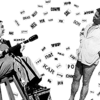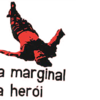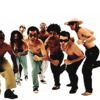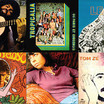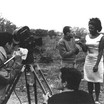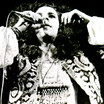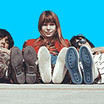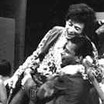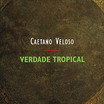Eubioticamente atraídos
symbol of the stupidest alienation
Controversy
SYMBOL OF THE STUPIDEST ALIENATION
Boal heavily criticizes Roberto Carlos and Tropicalismo
Folha da Tarde, May 29, 1968.
The first Anti-Tropicalista Manifesto has just been written by Augusto Boal and will be released at the 1a Feira Paulista de Opinião (1st Opinion Fair of São Paulo), which opens on June 5th at Teatro Ruth Escobar. Its theme is: WHAT DO YOU THINK OF TODAY’S BRAZIL? Boal discloses his opinion on Brazil and the art performed here in the essay “What do you think of left art?” which he wrote as the fair’s fundament. One of the chapters of this essay consists of the Anti-Tropicalista Manifesto called: “Chacrinha and Dercy in White Shoes”. In 5 items, Teatro Arena’s director exposes his opinion on the Movement of Caetano Veloso and others which has the banana as its inspiration and symbol.
1.Tropicalismo is neo-romantic – the resurgence of Romanticism is based on the attack against society’s appearances; it attacks inhuman usury (which supposes human usury), it attacks the pederast bourgeois (excluding the seducers) and the lesbian bourgeois (excluding the happy ones). It attacks the predicate, not the subject.
2.Tropicalismo is homeopathic – it intends to destroy tackiness by endorsing it, to criticize Chacrinha by participating of his programs. When the Tropicalistas appears on Chacrinha’s program, they follow all the program’s rules, not the Tropicalista’s ones – that is to say, the singer gently accepts the rules of the program’s game without ever trying to modify them: they dress appropriately, they sing the most recommended songs for this kind of doped audience and, finally, if this audience is used to getting cabbages, the singer, in a more subtle way, throws them bananas.
3. Tropicalismo is inarticulate – exactly because it attacks society’s surface, not essence, and because this surface is ephemeral and transitory, Tropicalismo does not articulate itself in any system – it simply curses the chameleon’s color. Their defenders can only allege vague desires to deride, a desire to deride and for vertiginous abysms; or they more moderately declare that “there is nothing to be declared”.
4. Tropicalismo is timid and genteel – it intends to épater but it can only enchanter les bourgeois. When another singer wears a colored robe, this strikes me as a lack of boldness. I will start to believe this Movement a little bit more when a Tropicalista has the courage to do what Baudelaire would already do a century ago: he had his hair dyed green and walked a colored turtle on a pink leash. The day any of them do something like that, perhaps some policeman will have a real headache… (It will doubtlessly contribute to the Brazilian revolution…)
5. Tropicalismo is imported – since JK’s developmental strategy, when Cinema Novo (New Cinema), Bossa Nova and the new Brazilian dramaturgy appeared, ever since Brazil had not imported art. Now, at the cinema, it is common for us to watch films directed by Vicent Minelli (or almost) for MGM, things like Garota de Ipanema; at the theatre, we watch a British avalanche mixed up with provincial cruelty, copied from the Grotowsky Living Theatre; when it comes to music, after iê-iê-iê we see the majority of our singers looking for costumes and even Roberto Carlos, who was already the symbol of the stupidest alienation, returned from Europe wearing Jack Lennon’s glasses and moustache.
These are the characteristics of Tropicalismo – states Augusto Boal – and the worst one of them is the lack of lucidity. This lack allows anyone to speak for everyone. Che Guevara represents at the same time a fight example and a method to conduct this fight. If people state that Che’s body is as tropical as a flying cockroach, they will simply be revealing their own reactionary and scoundrelly character. However, because inside Tropicalismo no one defines their own positions, any short-sighted imbecile, when mumbling stupidities such as this, intends to be speaking on the behalf of the whole Hawaiian group – and will effectively be until a Tropicalista sets the limits of the adopted style.
The 1a Feira Paulista de Opinão Sobre o Brasil also intends to denounce the tendencies of left art, which facilitate the right’s domination: the Neo-Realism which analyses peasants’, workers and lumpens’ lives, such as Plínio Marcos’s plays, functioning as a philanthropic empathy. By watching someone else’s misery, the spectators consider themselves non-guilty of the crime of also being responsible for that misery; the exhortative tendency, such as “Arena Contra Zumbi”, which adopts the manicheistic technique of conflict between the “wolf and the lamb”; the Tropicalismo “which intends to be everything and is nothing”. Teatro de Arena wants to figure out ways to overcome these tendencies, a way out to the left.
At the fair, the public will get in touch with these and other tendencies. They will see plays by Augusto Boal (A lua pequena and Caminhada perigosa), Bráulio Pedroso (É tua a história contada?) Lauro César Muniz (O líder) and Plínio Marcos (Verde que te quero verde). Works by poets and artists from São Paulo, such as Flávio Império, Aldemir Martins, Mario Chamie, Maria Bonomi, Manabu Mabe and others. Compositions by Ari Toledo, Caetano Veloso, Chico Buarque, Edu, Gil, Sérgio Ricardo and Pablo Neruda. Anyone can participate of the fair by sending a work of art – a picture, a sculpture, a caricature, a photography, a poster, a poem, a sentence, a text, a play, a song – answering WHAT DO YOU THINK OF TODAY’S BRAZIL?










